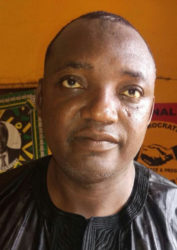BANJUL (Reuters) – The winner of Gambia’s presidential election told Reuters yesterday he was keen to form a new cabinet to get cracking with reforms, a day after veteran leader Yahya Jammeh stunned the tiny West African nation by conceding defeat.

Jammeh’s statement on state radio sparked wild celebrations in a country he has ruled with an iron hand since taking power in a coup 22 years ago, but doubts persisted over how he would step aside and whether the army would switch its allegiance.
Gambia lacks a formal timetable for the handover of power and Jammeh has not been seen publicly since the announcement of the election results, which showed his challenger Adama Barrow comfortably ahead.
“We want to get a cabinet in place and it all starts from there. We want reforms,” Barrow told Reuters at his home where hundreds of supporters had gathered to shake his hand. He said he had yet to meet army leaders but hoped to do so soon.
Jammeh led a government accused of crushing dissent and torturing opponents. He had said he would rule for a “billion years” and few believed he would allow himself to lose Thursday’s vote.
But in an address on state-owned radio on Friday evening, he accepted the official results, stunning observers across Africa.
The continent’s entrenched rulers such as Jammeh rarely lose elections so the result came as a shock, particularly given that other African leaders have since last year changed their country’s constitutions to prolong their rule.
The official results in the West African country of 1.8 million gave Barrow, a real estate developer who once worked as a security guard at retailer Argos in London, 45.5 per cent of the vote against Jammeh’s 36.7 per cent.
Yesterday vans packed with opposition supporters banging drums and honking horns rolled through the streets. There was a heavy army presence but few signs of hostility.
“I feel different and when we woke up people were happy. Now we are free to say everything we want,” said Yacouba Cisse, 34, a fisherman who was still wearing a pink whistle from overnight celebrations.
Others sounded a note of caution.
“I will only believe it when I see him leaving state house. He still controls the army and his family are the top brass,” said a businessman, who asked not to be named.
In a separate interview with Jeune Afrique magazine Barrow said he would free political prisoners, whom he praised for having fought for the country. He did not know the whereabouts of Jammeh but said he was free to live in Gambia.
“We don’t have a grudge against anyone. If there are files to be judged we will do it. We respect the constitution and the rights of all but the law will be applied to everyone,” he said when asked whether Jammeh might face justice.
Jammeh’s harshest critics say he should face prosecution at the International Criminal Court, although rights officials doubt there is enough evidence.
UN Special Representative for West Africa Mohamed Ibn Chambas told journalists in Banjul that he hoped to help Gambia form a truth and reconciliation commission.
Jammeh’s supporters deny abuses and he has often criticised Western powers for meddling in African affairs.



